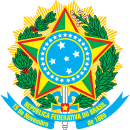
Back برازيليون Arabic برازيليين ARZ Braziliyalılar Azerbaijani Brasilers Catalan Бразилхой CE ᎠᏂᏆᏏᎵ CHR Brazilci Czech Brezilyayıc DIQ Βραζιλιάνοι Greek Brazilanoj Esperanto
Brasileiros | |
|---|---|
| Total population | |
| c. 203 million[1] (2022 census)  | |
| Regions with significant populations | |
| Brazilian diaspora: c. 4.9 million (2023)[2] | |
| 2,085,000[2] | |
| 513,000[2] | |
| 263,200[2] | |
| 230,000[2] | |
| 210,471[2] | |
| 170,400[2] | |
| 161,944[2] | |
| 159,000[2] | |
| 143,500[2] | |
| 101,502[2] | |
| 95,000[2] | |
| 92,493[2] | |
| 80,000[2] | |
| 80,000[2] | |
| 75,700[2] | |
| 64,000[2] | |
| 50,000[2] | |
| 48,180[2] | |
| 45,000[2] | |
| 31,050[2] | |
| 30,000[2] | |
| 25,000[2] | |
| Languages | |
| Portuguese (99.7%)[3] | |
| Part of a series on the |
| Culture of Brazil |
|---|
 |
| Society |
| Topics |
| Symbols |
Brazilians (Portuguese: Brasileiros, IPA: [bɾaziˈlejɾus]) are the citizens of Brazil. A Brazilian can also be a person born abroad to a Brazilian parent or legal guardian as well as a person who acquired Brazilian citizenship. Brazil is a multiethnic society, which means that it is home to people of many ethnic origins, and there is no correlation between one's stock and their Brazilian identity.
Being Brazilian is a civic phenomenon, rather than an ethnic one. As a result, the degree to which Brazilian citizens identify with their ancestral roots varies significantly depending on the individual, the region of the country, and the specific ethnic origins in question. Most often, however, the idea of ethnicity as it is understood in the anglophone world is not popular in the country.
After the colonization of Brazil by the Portuguese, most of the 16th century, the word "Brazilian" was given to the Portuguese merchants of the Brazilwood tree, designating exclusively the name of such profession, since the inhabitants of the land were, in most of them, indigenous, or Portuguese born in Portugal or in the territory now called Brazil.[4]
However, long before the independence of Brazil, in 1822, both in Brazil and in Portugal, it was already common to assign the Brazilian gentile to a person, usually of clear Portuguese descent, resident or whose family resided in the State of Brazil (1530–1815), belonging to the Portuguese Empire. During the lifetime of the United Kingdom of Portugal, Brazil and the Algarves (1815–1822), however, there was confusion about the nomenclature.
- ^ Araujo, Gabriel (28 June 2023). Grattan, Steven; Rumney, Emma (eds.). "Brazil census shows population growth at its slowest since 1872". Reuters. Archived from the original on 29 June 2023.
- ^ a b c d e f g h i j k l m n o p q r s t u v w "Comunidade Brasileira no Exterior - Estimativas referentes ao ano de 2023" (PDF) (in Brazilian Portuguese). Ministry of External Relations. 1 July 2024. Retrieved 19 November 2024.
- ^ "Brazil". Ethnologue. Archived from the original on 8 July 2015. Retrieved 21 July 2015.
- ^ Facioli, Valentim (25 February 2018). Um defunto estrambótico: análise e interpretação das Memórias póstumas de Brás Cubas. EdUSP. ISBN 9788531410833. Archived from the original on 18 January 2024. Retrieved 25 October 2020 – via Google Books.